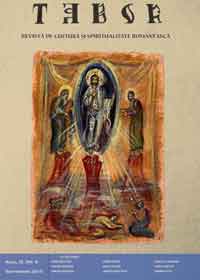Căsătorie şi feciorie – aprecierea şi ierarhizarea lor la Sfântul Grigorie de Nyssa
Marriage and virginity - their assessment and their ierarchy at St. Gregory of Nyssa
Author(s): Teodor (Theodoros) ZisisSubject(s): Christian Theology and Religion, Eastern Orthodoxy
Published by: Renaşterea Cluj
Keywords: Gregory of Nyssa; virginity; marriage; hierarchy; neo-orthodox
Summary/Abstract: In this article, the author attempts to address the issue of marriage and virginity (assumed in Christ) and to present the Church’s perspective on the two ways of life, and the relationship between them and their hierarchy. To do this, the author uses the teaching of St. Gregory of Nyssa, who - though he himself married - wrote one of the reference patristic treaties on virginity. But before talking about St. Gregory and his teaching, the article makes a brief statement of how the Church and the Holy Fathers evaluates marriage as an institution set and blessed by God, having the purpose to strengthen the love and union of the spouses and to ensure the perpetuation of the human race. On the other hand, marriage is linked to the inherent concerns and bonds of everyday life that often turn out to hinder spiritual life and complete relationship with God. For this reason, the Fathers placed virginal life on a higher level, as a better way to live detached from earthly cares, in union with God and closer to perfection. In this regard, the virginal life is reckoned as foreshadowing, yet within this world, the coming age, the eternity, when „they neither marry, nor are given in marriage, but are as the angels of God in heaven. „ (Mt. 22: 30). The article is written in the context of an existing controversy in Greece with the so-called „neo-orthodox” movement that exalted marriage and raised it to a level that the Church Fathers never had. According to this „neo-orthodox” view, marriage, and more specifically the bodily union between man and woman is the image of the mystical union between man and God, and those who have not tasted this bodily union can not really taste the union between man and God. Being in obvious contradiction with the Church Fathers (who also led a most virginal life), this view and its implications is successfully countered by the author. After presenting the „neo-orthodox” positions and their criticism, the author goes to the actual presentation of the teaching of St. Gregory of Nyssa on marriage and virginity, which only confirms, more effectivelly and with more arguements, all those stated in the introduction to the article about how Church considers marriage and virginity and about the hierarchy and relationship between the two.
Journal: TABOR. Revistă de cultură şi spiritualitate românească
- Issue Year: IX/2015
- Issue No: 09
- Page Range: 5-14
- Page Count: 10
- Language: Romanian
- Content File-PDF

